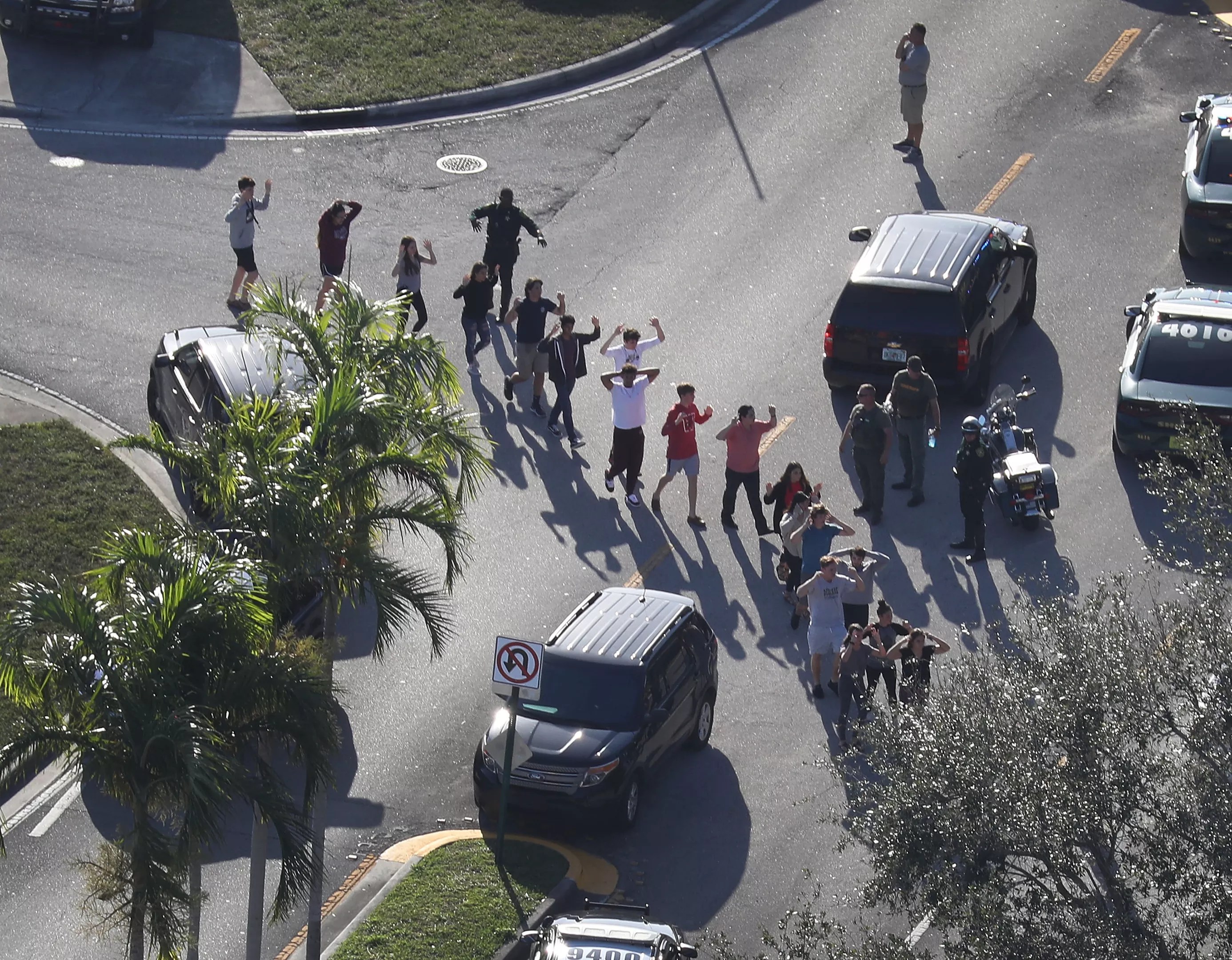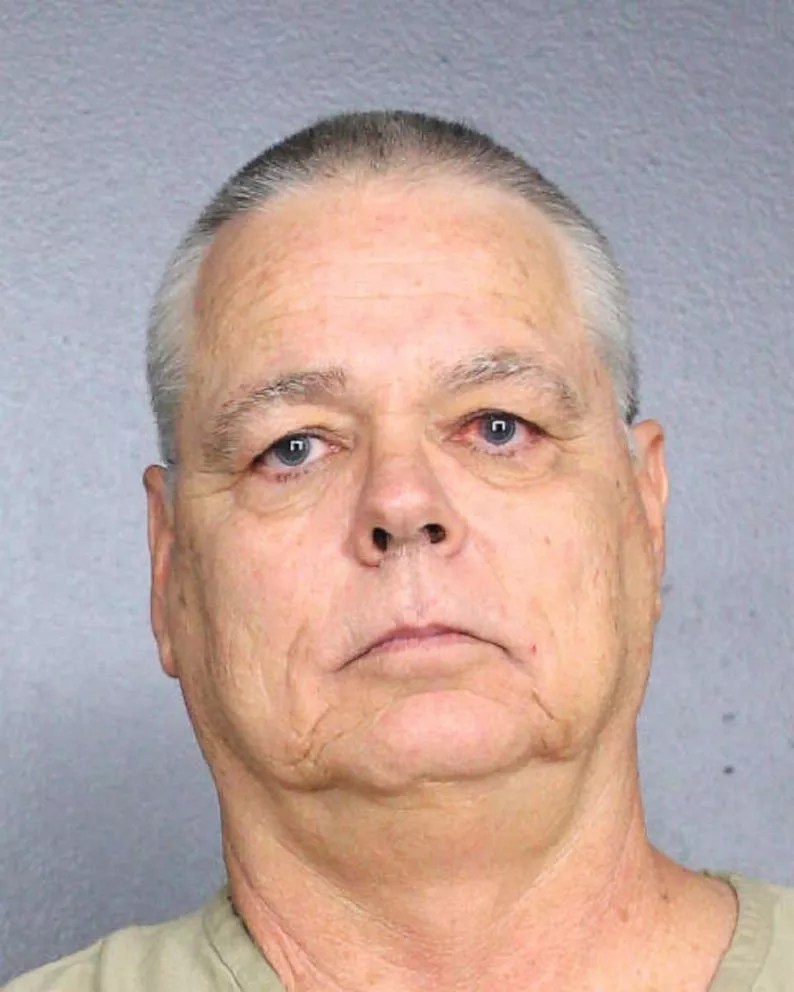
Photo by Joe Raedle/Getty Images

Audio By Carbonatix
Four years after a school resource officer was arrested for failing to confront the shooter during the Marjory Stoneman Douglas High School massacre, a jury has acquitted him on all charges.
Scot Peterson was arrested in June 2019 on nearly a dozen criminal charges for taking cover instead of confronting the expelled high school student who gunned down 14 students and three staff members inside the high school’s 1200 building on February 14, 2018. Peterson was charged with seven counts of felony child neglect and three counts of culpable negligence for “knowingly and willingly” failing to act “pursuant to his law enforcement training and sworn duties,” according to prosecutors.
He also faced a perjury charge for allegedly lying to investigators about the number of gunshots he heard while arriving at the scene and whether he saw people fleeing from the building where the shooting occurred.
After four days of deliberations, jurors delivered their decision on the afternoon of June 29: not guilty.
Gasps broke out in the courtroom, and Peterson broke down in tears.
“I got my life back,” Peterson told reporters outside the courtroom following the decision. “It’s been an emotional rollercoaster for so long, endless nights.”
He added: “Don’t anybody ever forget this was a massacre on February 14. The only person to blame was that monster…Everybody did the best they could. We did the best we could with the information we had.”
Linda Beigel Schulman, the mother of Marjory Stoneman teacher Scott Beigel, one of the school staffers killed in the massacre, criticized the former deputy for his post-verdict statement.
“Well, bravo for getting your life back. I cannot get my son’s life back,” she told ABC News Live.
In the aftermath of the shooting, Peterson was lambasted by a laundry list of law enforcement officials and politicians, from then-Broward County Sheriff Scott Israel to then-President Donald Trump. He resigned amid a media frenzy during which he was dubbed the “Coward from Broward.”
Peterson was accused of cowering for more than 40 minutes outside the school’s three-story 1200 building during the six-minute massacre and for an extended period afterward. As previously reported by New Times, one officer who later arrived at the scene recalls seeing Peterson take cover behind a wall of concrete with his gun drawn, while another told investigators he saw Peterson pacing outside the building saying, “Oh my god, I can’t believe this,” but failing to do anything.

Broward Sheriff’s Office photo
When the gunshots broke out, Peterson was seen on school cameras driving towards the 1200 building in a golf cart with two school security monitors. He then took his position outside the building while the attack raged inside. A group of students was seen in the footage running on the lawn.
His attorney, Mark Eiglarsh, argued that the then-Broward Sheriff’s Office deputy didn’t enter the building because he couldn’t tell where the shots were coming from.
Peterson, now 60, has long defended his actions that day. He claimed that while outside, he requested road closures and asked for the school and the surrounding area to be locked down.
According to call summaries released by the sheriff, Peterson told police dispatch during the attack, “Do not approach the 12 or 1300 building. Stay at least 500 feet away at this point.”
While police transmissions pointed to some confusion over the source of the shots, the Florida Department of Law Enforcement noted that Peterson communicated to other officers that he heard gunfire “over by inside the 1200 building.”
A Broward Sheriff’s Office timeline stated that the shooter dropped his assault rifle and left the building at roughly 2:28 p.m. that day. Five minutes later (11 minutes after the massacre began), police made their first entry into the building.
By that time, the shooter was long gone. He stopped at a local McDonald’s and walked around the neighborhood before Coconut Creek Police officer Michael Leonard apprehended him on a sidewalk after recognizing that he matched the description of the shooter.
When Peterson was charged, his lawyer Joseph DiRuzzo called the case unprecedented. DiRuzzo said no police officer in modern history had ever been charged for an allegedly deficient response to a mass shooting. He claimed, “The individuals who have made this charging decision have taken the easy way out and blamed Mr. Peterson.”
In an 18-page letter to the state commission investigating the tragedy, which he sent in May 2018, Peterson said his actions “were consistent with the training I had received for the past 30 years” before claiming that then-sheriff Scott Israel made him a “scapegoat.”
Broward Sheriff’s Office records show that in the two years prior to the shooting, deputies had been alerted at least twice that the would-be shooter had made comments indicating he was planning a massacre.
In February 2016, the sheriff’s office received a tip warning that the teenager was planning to shoot up a school and had posted Instagram pictures of himself with guns. The following year – two-and-a-half months before the attack on Marjory Stoneman Douglas High School – the sheriff’s office received a call advising that he was “collecting guns and knives” and “could be a school shooter in the making,” law enforcement records state.
In neither instance did the sheriff’s office arrest the teenager or order an involuntary psychiatric hospitalization.